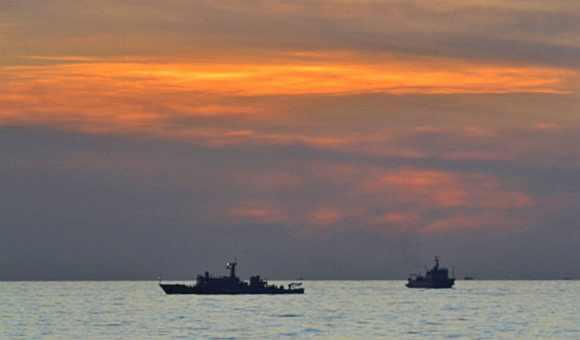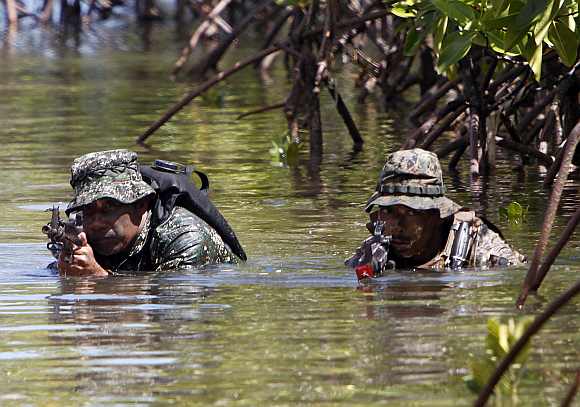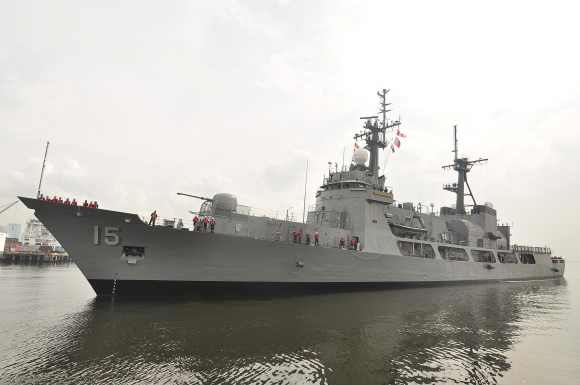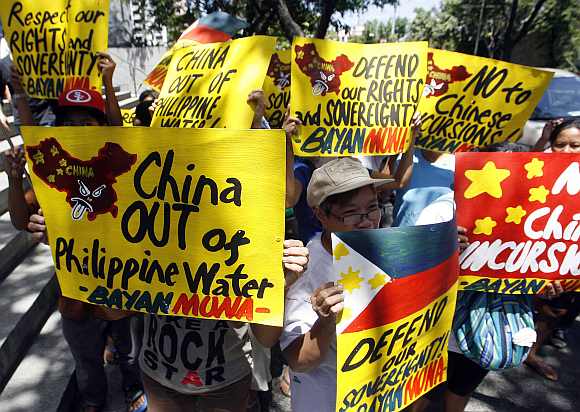
China's aggressive posturing over maritime boundaries has caused East Asian countries to look at other powers for support.
It's those Chinese fishing vessels again. Last month they ventured into a shoal in the South China Sea, presumably hunting for giant clams, when they were apprehended by the Philippines' naval patrols.
If the Philippines claims the Scarborough shoal -- a few hectares worth of low-lying rocks 200 kilometres from its shores -- China claims the entire South China Sea as its own. In what has become a familiar pattern over the last few years, the Chinese fishing vessels triggered off a confrontation that quickly escalated into a maritime and diplomatic standoff. Chinese tourists left the Philippines, and Filipino bananas face an uncertain prospect now in clearing China's food safety tests.
The two countries are now trying to back off at this time, but not before the 'W' word surfaced in the popular discourse.
Click NEXT to read further...

War? Over some uninhabited rocks in the middle of nowhere? Between China (GDP $7.3 trillion, defence budget $106.4 billion) and the Philippines (GDP $213 billion, defence budget $2.3 billion)? Who would want it?
Not China. While it certainly wants to keep its territorial claims alive by letting intrepid fishing vessels do to South China Sea islands what dogs do to lamp posts, it knows that an outright military conflict will be counterproductive to its longer-term interests.
Provocative fishing vessels and Beijing's aggressive diplomatic posturing over maritime boundaries have already caused East Asian countries to look at the United States, India and other powers for support. In case China finds itself in a war with the Philippines, opposition to Beijing will consolidate, and the United States will make strategic inroads into the region, making it harder for China to achieve its goal of dominating the Western Pacific.

The US too does not want a war. It has a military alliance with the Philippines, and Manila could call upon US support if it is attacked. Washington is understandably reluctant to let itself be dragged into a war against a great power by a small ally over a tiny issue. The Obama administration has signalled that territorial disputes are outside the scope of the defence pact. Even so, if it is seen as shirking from supporting its ally, the value of Washington's strategic promissory notes in East Asia will sharply depreciate. It cannot, however, support its ally without provoking Beijing. A war would cause the US to choose between losing its reputation and getting into an unwanted confrontation with China.
Most East Asian countries do not want war either. They have spent the last decade attempting to engineer "regional security architectures" -- essentially multilateral forums that discuss security issues -- that hope to solve tricky geopolitical disputes without being bullied and without having to fight.
Yet for all its achievements, the Association of South East Asian Nations has little to show in terms of ability to manage armed conflict, even between its member states. Thailand, for instance, has stonewalled the deployment of Indonesian military observers over its border dispute with Cambodia over the Preah Vihear temple.

Nor has ASEAN been very vocal in insisting that China comply with the code of conduct in the South China Sea they agreed to in 2002. Its member states are unlikely to want their solidarity to be put to the kind of test that a China-Philippines naval conflict would entail.
What about the Philippines itself? For Manila, maritime boundaries in the South China Sea assume an economic significance that goes beyond nationalistic sentiment over territory. The seabed is supposed to have rich reserves of oil and natural gas, although estimates vary. The technology to exploit natural gas fields in the South China Sea is maturing.
China National Offshore Oil Corporation already has semi-submersible deep sea drilling platforms. Manila has its eyes on healthy revenue streams from energy exports, which can make a substantial difference to its fiscal position and overall economic health.

This, coupled with the security guarantee the Philippines enjoys by virtue of its alliance with the US, has caused it to stand firm and confront China. So much so that Dai Bingguo, one of Beijing's top foreign policy hands, accused the Philippines, "a smaller country", of bullying China. He has a point. As China's leaders ought to know all too well, small countries that are backed by great powers have disproportionate negotiating power, and they "bully" both their adversaries and their backers. The Philippines might calculate that it has relatively less to lose by letting tensions escalate.
That's the main risk -- when pesky fishing boats, Chinese law enforcement vessels and Philippines naval ships are facing off each other, an accidental trigger can cause an unintentional escalation. Given the turbulence in China's civil-military relations ahead of this autumn's leadership transition, and the numerous Chinese state agencies engaged in the South China Sea, the risk of escalation is higher on its side. The onus, therefore, is on Beijing to keep a lid on the tensions.

Click on MORE to see another set of PHOTO features...